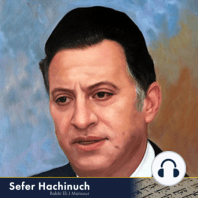20 min listen
Misva #397: The Red Heifer
FromSefer Hachinuch
ratings:
Length:
20 minutes
Released:
Feb 20, 2023
Format:
Podcast episode
Description
In the beginning of Parashat Hukat (Bamidbar, chapter 19), the Torah introduces the Misva of the Para Aduma – the “red heifer” which was slaughtered and then burned in order to prepare purifying waters with its ashes. These waters were used to bring purity to people and objects that had become Tameh (impure) through contact with a human corpse. The Sefer Ha’hinuch, which the author wrote for his son, explaining the 613 Misvot and their underlying reasons, writes in the context of this Misva, “Rafu Yadai” – “My hands are weak,” meaning, he is powerless to offer a rational explanation for the Misva of Para Aduma. He says that he is afraid to say anything about the reasoning behind this Misva, which even King Shelomo said he could not understand. The Sefer Ha’hinuch adds that the notion of an animal sacrifice bringing purity in itself is not difficult to understand. A precedent for this concept is the requirement for a Yoledet (woman after childbirth), a Zab and Zaba (people who experienced an unusual discharge) to offer certain sacrifices to fully regain their status of purity so they can enter the Bet Ha’mikdash. The difficulty in understanding the Para Aduma, the Sefer Ha’hinuch writes, is the opposite effects that it has. Somebody who is impure regains his purity by having the Para Aduma waters sprinkled on him, but all those involved in the preparation of the Para Aduma waters become impure as a result of contact with the ashes. It turns out, then, that the same ashes which bring purity also bring impurity. The Sefer Ha’hinuch concedes that some herbal medications have opposite effects, such as cooling those who are overheated and warming those whose body temperature is low. Nevertheless, this feature of the Para Aduma remains an enigma, leading even King Shlomo, the wisest of all men, to acknowledge his inability to understand the reasoning behind this Misva, as mentioned earlier. Rav Yaakob Kamenetsky (1891-1986) noted that from the Sefer Ha’hinuch’s discussion it appears that the Torah specifically intended for this law to be a “Hok” – a command whose reasoning eludes our comprehension. The Torah wanted that we would not have access to the reason behind this Misva so that we acknowledge that ultimately, we observe all Misvot purely out of a sense of subservience to Hashem, regardless of whether or not we understand why they were commanded. The cow chosen as the Para Aduma should be between 3 and 4 years of age. During a cow’s fifth year, it should not be used, but if was slaughtered and burned, then the ashes may be used for the purifying waters. If the cow was younger than 3 years of age, it may not be used, even after the fact, if it was slaughtered and burned. The Torah requires that the red heifer be “Temima” (“complete”), implying that it must be completely red. Even two white or black hairs disqualify the cow for use as a Para Aduma. The cow does not become disqualified if the hairs turn white at the tips. As long as the root of the hair is red, one can cut off the white tip, and the cow remains suitable as the Para Aduma. Another condition which the Torah requires is “Asher Lo Ala Aleha Ol” – that no “yoke” had been placed on the cow. The Sages understood that this refers to any sort of burden, light or heavy, placed on the cow’s back. Even if somebody placed his garment on the cow, the cow may not then be used as the Para Aduma. The cow for the Para Aduma was purchased from the money in the treasury of the Bet Ha’mikdash (“Terumat Ha’lishka”). The person who burns the cow becomes Tameh, as do the person who mixes the flesh in the fire, the person who places wood in the fire, and the one who stokes the coals. Extreme precautions were taken to ensure that the Para Aduma would remain pure. The Kohen who would prepare the ashes was taken out of his home seven days prior and kept guarded from sources of impurity. On each of those seven days, he would be sprinkled with preexisting purifying waters. All the utensils used
Released:
Feb 20, 2023
Format:
Podcast episode
Titles in the series (100)
Misva #21: Telling the Story of the Exodus on the Night of the 15th of Nissan: Daily Sefer Hachinuch - Brought to you by itorah.com by Sefer Hachinuch
